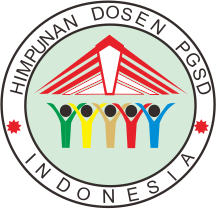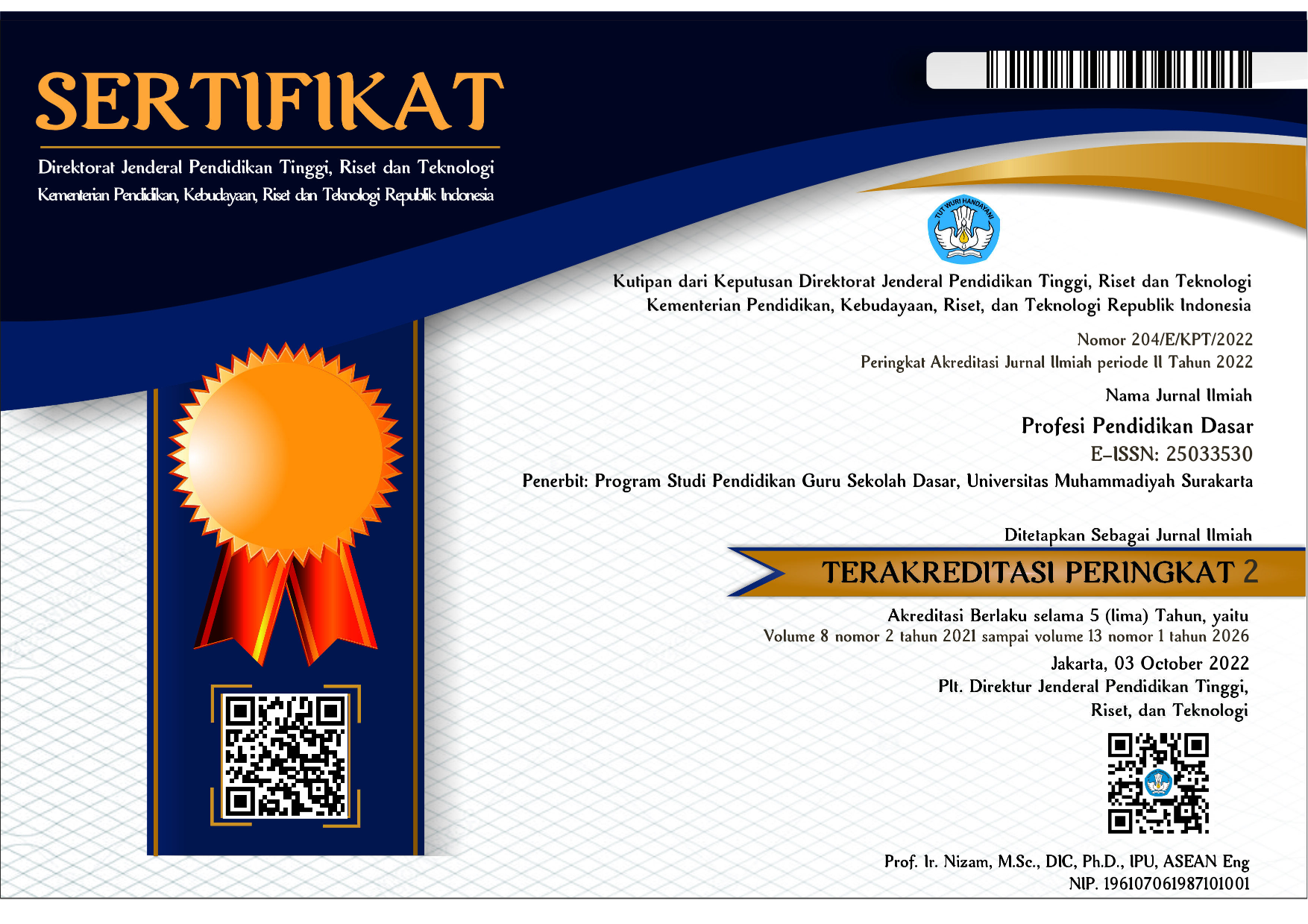Digital Literacy and TPACK’s Impact on Preservice Elementary Teachers’ Ability to Develop Science Learning Tools
Sarah Fazilla(1*), Anita Yus(2), Muthmainnah Muthmainnah(3)(1) IAIN Lhokseumawe, Lhokseumawe
(2) Universitas Negeri Medan, Medan
(3) Universitas Bina Bangsa Getsempena, Banda Aceh
(*) Corresponding Author
Abstract
The transition of education from the 4.0 era of the Industrial Revolution to the 5.0 era of the Social Revolution necessitates educators’ skill development. Particularly, technology-based learning devices must be designed with digital literacy and Technological Pedagogical Kontent Knowledge (TPACK) skills in mind so that learning tools for teachers are more creative and innovative. The purpose of this study was to determine the impact of digital literacy and Technological Pedagogical Content Knowledge (TPACK) on the ability of prospective Madrasah Ibtidaiyah science teachers to create learning tools. This study employed a survey approach. Madrasah Ibtidaiyah (Islamic Primary School) IAIN Lhokseumawe sixth-semester preservice teacher students were the subjects of this study. The data collection method employed a questionnaire and a straightforward regression analysis. The results demonstrate a strong correlation between digital literacy and the ability to compose science learning tools. A t-table value of 9.880 indicated a positive and significant relationship between digital literacy and the capacity to organize science learning tools. With a t-table value of -0.562, TPACK has no significant effect on the ability to compose learning tools. Therefore, it can be concluded that digital literacy has a positive effect on the ability of preservice Islamic primary teachers to create science learning tools for their students.
Keywords
Full Text:
PDFReferences
Akhwani & Rahayu, D. W. (2021). Analisis Komponen TPACK Guru SD sebagai Kerangka Kompetensi Guru Profesional di Abad 21. Jurnal Basicedu, 5(4), 1918–1925. https://doi.org/10.31004/basicedu.v5i4.1119
Aktaş, İ., & Özmen, H. (2020). Investigating the impact of TPACK development course on pre-service science teachers’ performances. Asia Pacific Education Review, 21(4), 667–682. https://doi.org/10.1007/s12564-020-09653-x
Altun, D. (2019). Investigating Pre-Service Early Childhood Education Teachers’ Technological Pedagogical Content Knowledge (TPACK) Competencies Regarding Digital Literacy Skills and Their Technology Attitudes and Usage. Journal of Education and Learning, 8(1), 249. https://doi.org/10.5539/jel.v8n1p249
Elya umi Hanik. (2020). Self Directed Learning Berbasis Literasi Digital Pada Masa Pandemi Covid-19 Di Madrasah Ibtidaiyah. Elementary Islamic Teacher Journal, 8, 183–208. Doi: 10.21043/elementary.v8i1.7417.
Fahrurrozi, M., & Mohzana. (2020). Pengembangan Perangkat Pembelajaran: Tinjauan Teoretis dan Praktek (Vol. 51, Issue 1).
Furqon Arbianto, U., Widiyanti, W., & Nurhadi, D. (2019). Kesiapan Technological, Pedagogical And Content Knowledge (TPACK) Calon Guru Bidang Teknik di Universitas Negeri Malang. Jurnal Teknik Mesin Dan Pembelajaran, 1(2), 1. https://doi.org/10.17977/um054v1i2p1-9
Hobbs, R. (2010). Digital_and_Media_Literacy_A_Plan_of_Action.pdf. https://www.aspeninstitute.org/wp-content/uploads/2010/11/Digital_and_Media_Literacy.pdf
Kartal, T., Dilek, I., & Preservice, I. (2021). Preservice Science Teachers TPACK Development in a Technology-Enhanced Science Teaching Method Course To cite this article : Preservice Science Teachers ’ TPACK Development in a Technology- Enhanced Science Teaching Method Course. https://doi.org/https://doi.org/10.21891/jeseh.994458
Prasetyo, T., Yektyastuti, R., & Maulidini, Y. D. (2019). Pengaruh Literasi TIK Terhadap Technological Pedagogical Content Knowledge (TPACK) Guru. Jurnal Ilmiah Untuk Peningkatan Mutu Penddikan E-ISSN:, 6(1), 13–20. https://doi.org/10.21009/Improvement.061.02.
Schmid, M., Brianza, E., & Petko, D. (2021). Self-reported technological pedagogical content knowledge (TPACK) of pre-service teachers in relation to digital technology use in lesson plans. Computers in Human Behavior, 115(September 2020), 106586. https://doi.org/10.1016/j.chb.2020.106586
Setyaningsih, R., Abdullah, A., Prihantoro, E., & Hustinawaty, H. (2019). Model Penguatan Literasi Digital Melalui Pemanfaatan E-Learning. Jurnal ASPIKOM, 3(6), 1200. https://doi.org/10.24329/aspikom.v3i6.333
Sholihah, M., Yuliati, L., & Wartono. (2016). Peranan TPACK Terhadap Kemampuan Menyusun Perangkat Pembelajaran Calon Guru Fisika Dalam Pembelajaran Post-Pack. Jurnal Pendidikan: Teori, Penelitian, Dan Pengembangan, 1(2), 144–153. http://dx.doi.org/10.17977/jp.v1i2.6115.
Shopie Azizah, D., Anjani Putri, D., & Mulhayatiah, D. (2021). Prospective Science Teacher TPACK Skills in Preparing the Lesson Plans. Jurnal Geliga Sains: Jurnal Pendidikan Fisika, 8(2), 132. https://doi.org/10.31258/jgs.8.2.132-139
Sugiyono. (2016). Metode Penelitian Kuantitatif, Kualitatif, R & D. Alfabeta.
Suyamto, J., Masykuri, M., & Sarwanto, S. (2020). Analisis Kemampuan TPACK (Technolgical, Pedagogical, and Content, Knowledge) Guru Biologi Sma Dalam Menyusun Perangkat Pembelajaran Materi Sistem Peredaran Darah. INKUIRI: Jurnal Pendidikan IPA, 9(1), 46. https://doi.org/10.20961/inkuiri.v9i1.41381
Tang, C. M., & Chaw, L. Y. (2015). Digital literacy and effective learning in a blended learning environment. Proceedings of the European Conference on E-Learning, ECEL, 14(1), 601–610.
Uno, H. B. N. M. (2011). Belajar Dengan Pendekatan PAILKEM: Pembelajaran Aktif, Inovatif, Lingkungan, Kreatif, Menarik. Bumi Aksara.
Zimmermann, F., Melle, I., & Huwer, J. (2021). Developing Prospective Chemistry Teachers’ TPACK-A Comparison between Students of Two Different Universities and Expertise Levels Regarding Their TPACK Self-Efficacy, Attitude, and Lesson Planning Competence. Journal of Chemical Education, 98(6), 1863–1874. https://doi.org/10.1021/acs.jchemed.0c01296
Article Metrics
Abstract view(s): 1417 time(s)PDF: 851 time(s)
Refbacks
- There are currently no refbacks.


















